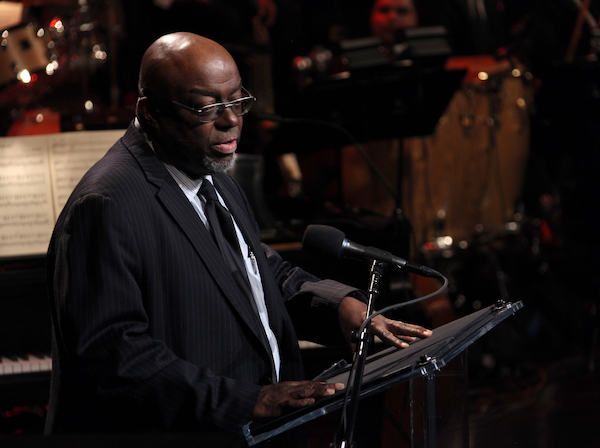Jan 13, 2026 2:09 PM
More Trump-Kennedy Center Cancellations
The fallout from the renaming of the John F. Kennedy Center for the Performing Arts to include President Donald…

Critic and author Stanley Crouch speaks at the 2012 NEA Jazz Masters ceremony.
(Photo: Michael G. Stewart)If we’re all still struggling to define what “jazz” is—or if it’s even necessary to land on an answer—Stanley Crouch’s life traced the contours of that conversation, and in some ways, led it.
Crouch, a critic and writer who was as erudite as he was divisive, died Sept. 16 in New York at the age of 74.
He was a public figure for jazz during a time when the music found itself amid declining influence in American culture, and came to advocate for a traditional aesthetic that belied his connection to the avant-garde in the 1970s. Along with trumpeter Wynton Marsalis, Crouch helped conceptualize in 1987 what would become Jazz at Lincoln Center.
Crouch and Marsalis also appeared in the 2001 PBS documentary Jazz, directed by Ken Burns, where the pair focused on swing and blues as defining elements of the music.
The passion with which Crouch defended his perspective, though, sometimes overflowed into aggression; numerous accounts of physical confrontations with those he disagreed with have floated around the jazzworld for years. He reportedly was let go from a position at the Village Voice following an altercation with another writer.
Crouch, who became a NEA Jazz Master in 2019, also inexplicably outted pianist Cecil Taylor in the 1970s.
As much as he contributed to proper criticism and discussion of the music, he also pivoted and dissected the largely white group of critics who covered jazz, writing in a 2003 JazzTimes column, “Their job, they believe, is to speak up for the exotic Negro or use that Negro as a weapon against their own middle-class backgrounds or make that Negro into a symbol of their desire to do something bold, wild and outside of convention.”
He believed the stance resulted in being dismissed from the publication. It furthered discussions around the genre, but so did his book-length works.
“While Stanley was known—revered and rebuked—as a provocateur in several genres, two things may stand as testaments to his cultural impact: his relationship with Wynton Marsalis and their founding of Jazz at Lincoln Center, and the other, his biography Kansas City Lightning on the early years of Charlie ‘Yardbird’ Parker,” said Herb Boyd, an author, educator and DownBeat contributor.
Born in Los Angeles on Dec. 14, 1945, Crouch held a variety of college teaching positions in California prior to moving to New York in 1975, where his writing career and influence in jazz blossomed. He’s survived by his wife, the artist Gloria Nixon-Crouch. DB

Belá Fleck during an interview with Fredrika Whitfield on CNN.
Jan 13, 2026 2:09 PM
The fallout from the renaming of the John F. Kennedy Center for the Performing Arts to include President Donald…

Peplowski first came to prominence in legacy swing bands, including the final iteration of the Benny Goodman Orchestra, before beginning a solo career in the late 1980s.
Feb 3, 2026 12:10 AM
Ken Peplowski, a clarinetist and tenor saxophonist who straddled the worlds of traditional and modern jazz, died Feb. 2…

The success of Oregon’s first album, 1971’s Music Of Another Present Era, allowed Towner to establish a solo career.
Jan 19, 2026 5:02 PM
Ralph Towner, a guitarist and composer who blended multiple genres, including jazz — and throughout them all remained…

Rico’s Anti-Microbial Instrument Swab
Jan 19, 2026 2:48 PM
With this year’s NAMM Show right around the corner, we can look forward to plenty of new and innovative instruments…

Richie Beirach was particularly renowned for his approach to chromatic harmony, which he used to improvise reharmonizations of originals and standards.
Jan 27, 2026 11:19 AM
Richie Beirach, a pianist and composer who channeled a knowledge of modern classical music into his jazz practice,…